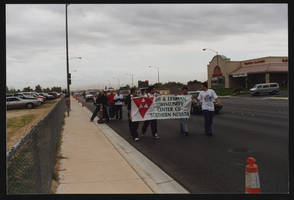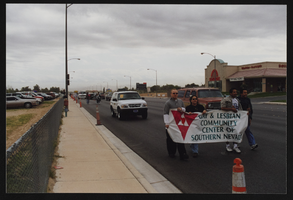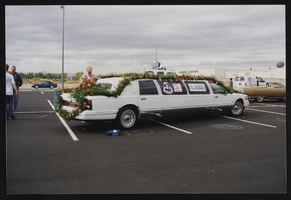Search the Special Collections and Archives Portal
Search Results
Aquiles Garcia oral history interview
Identifier
Abstract
Oral history interview with Aquiles Garcia conducted by Claytee D. White on January 10 and February 20, 2015 for the Boyer Early Las Vegas Oral History Project. Garcia discusses the political atmosphere and risks of being gay in Juan Perón’s Argentina in the 1940s, Las Vegas, Nevada life in the late 1950s and early 1960s, and his dual Las Vegas careers as a dancer and a casino dealer throughout the second half of the twentieth century.
Archival Collection

Gay and Lesbian Community Center of Southern Nevada in the second annual Gay Pride parade, image 001: photographic print
Date
Archival Collection
Description
Image

Gay and Lesbian Community Center of Southern Nevada in the second annual Gay Pride parade, image 002: photographic print
Date
Archival Collection
Description
Image
Gay and Lesbian Community Center of Southern Nevada queer history exhibit: photographic prints, 1998 October 08
Level of Description
Archival Collection
Collection Name: Dennis McBride Photograph Collection
Box/Folder: Box 042
Archival Component

James A. Gay III interview, 1973: transcript
Date
Archival Collection
Description
Interview with James A. Gay III conducted by Joyce M. Wright in 1973. Edited by Elizabeth Nelson Patrick, and transcribed for the project "Black Experience in Southern Nevada, Donated Tapes Collection," James R. Dickinson Library, University of Nevada, Las Vegas, December 1978. Arriving in 1946 from Fordyce, Arkansas, Gay became the first African-American mortician in Las Vegas. He later worked as Assistant Manager of the Sands Hotel and Casino and Union Plaza while serving as an executive board member of the Culinary Union. Instrumental in the Las Vegas community, Gay worked to improved race relations, addressing social, economic, and civic issues. Gay was awarded an honorary degree from the University of Nevada, Las Vegas in 1988.
Text

Las Vegas Bugle float at the second annual Gay Pride parade: photographic print
Date
Archival Collection
Description
Image
Audio recording clips of interview with Hazel Gay by Claytee D. White, December 2, 1995
Date
Archival Collection
Description
Interview with Hazel Gay conducted by Claytee D. White on December 2, 1995. Hazel and her husband Jimmy Gay moved to Las Vegas in 1946, becoming leaders in the African American community during the civil rights era.
Sound
Larry Cooper oral history interview
Identifier
Abstract
Oral history interview with Larry Cooper conducted by Claytee D. White on March 05, 2018 for the African Americans in Las Vegas: a Collaborative Oral History Project. In this interview, Cooper discusses his early life in Las Vegas, Nevada and growing up in the Westside. He talks about his educational experiences in Las Vegas, attending the Arkansas Agricultural, Mechanical and Normal College (now University of Arkansas at Pine Bluff), and teaching mathematics. Cooper recalls his employment at Southwestern Bell Telephone Company, becoming Vice President of Emerging Markets, and relocating around the United States for work. He remembers moving back to Las Vegas in the mid-2000s, his friendship with civil rights leader Jimmy Gay, and the contributions Gay made for the African American community. Cooper describes Westside businesses, and casinos on Jackson Street. Lastly, Cooper discusses the future of the Westside.
Archival Collection
